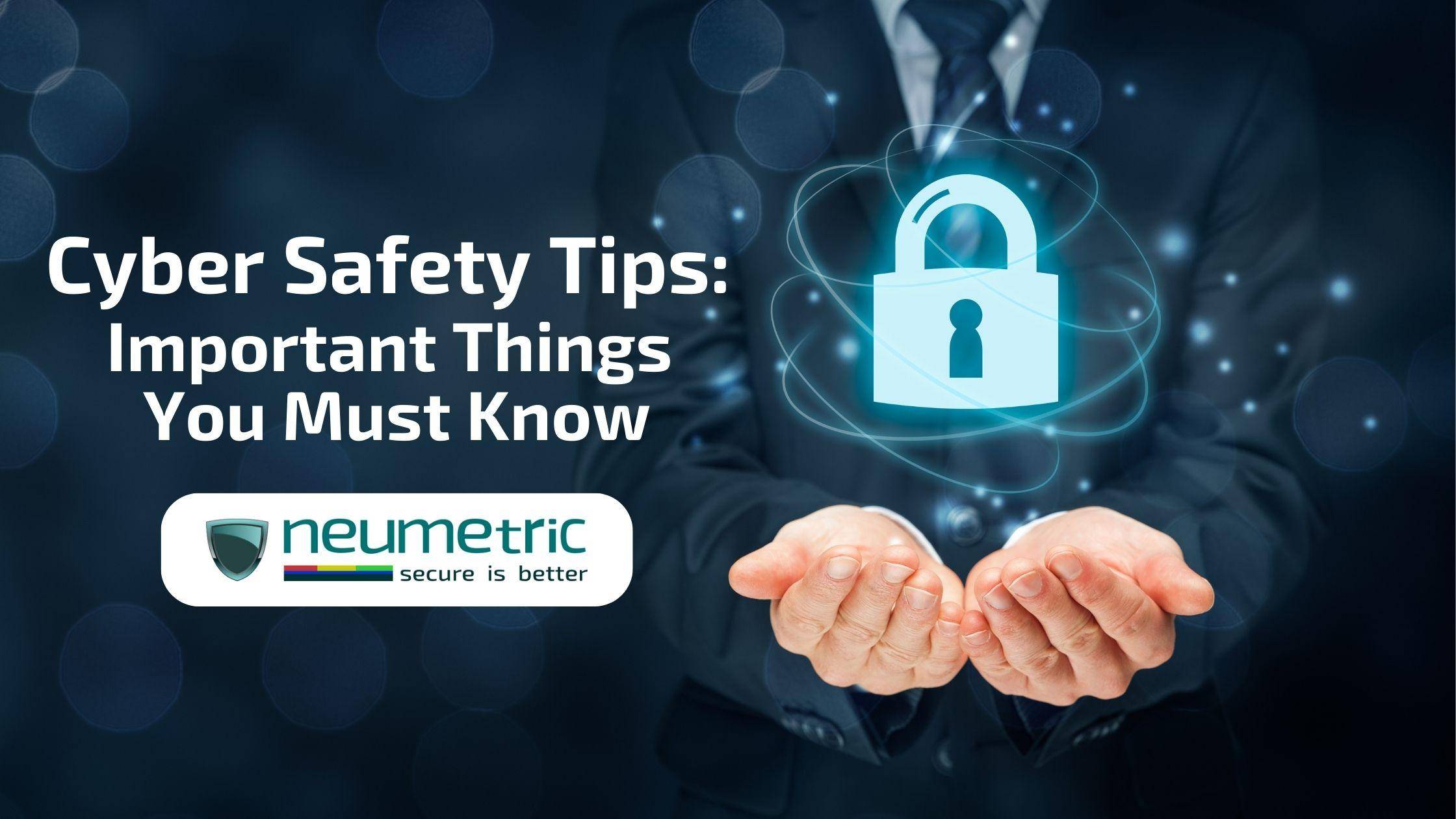Table of Contents
ToggleIntroduction
Cybercriminals are always looking for new ways to trick you into giving up your personal information. The best way to protect yourself is to know how criminals use the Internet, what their strategies are, and how they can be prevented from harming you or your family. The Cyber Safety Tips outlined in this article will help you remain safe in the digital world.
What Is CyberSecurity?
Cyber Security Awareness is a term used to describe a broad range of activities and initiatives designed to increase awareness of the importance of cybersecurity in all aspects of daily life. Cybersecurity is the protection of computers, networks, programs and data from theft or damage to ensure their integrity, confidentiality and availability.
This may include using strong passwords, keeping personal devices secure on work networks (which can be managed by an IT department) changing default passwords for hardware like routers or modems that connect your computers to the internet (or purchasing equipment with pre-set passwords), keeping software up-to-date and running antivirus protection software on any computer that accesses the internet.
4 ACTIONS TO TAKE TO VISIT YOURSELF IN CYBER
- Password: Use a strong password for all your online accounts and well as your devices.
- Privacy: Be careful with your privacy settings for social media and other online accounts.
- Updates: Always keep all of your devices’ software up to date.
- Multi Factor Authentication: Use two-factor authentication (2FA) on all accounts. Consider multi factor authentication (MFA) when possible.
8 Expert Suggested Cyber safety tips:
- Think twice before clicking on links or opening attachments.
- Verify requests for private information.
- Protect your passwords.
- Protect your devices from theft and other attacks.
- Keep your devices, browsers and apps up to date.
- Backup critical files.
- Delete sensitive information when it’s no longer needed.
- If you find any suspicious emails or SMS, report it.
How to Stay Safe Online?
Let’s look at a few more cyber safety tips that will help you secure your digital identity and remain safe in the cyber world.
You should be using two-factor authentication on every account that supports it. Two-factor authentication is a security feature that requires an additional factor (such as a physical USB key, PIN, OTP, etc) in addition to your username and password when logging into a service or device. It adds an extra layer of protection against cybercriminals by requiring them to have both something they know (your login information) and something they have (the additional factor).
You should also make sure that all the software installed on your computer is up to date, including browsers, operating systems and other programs. This ensures that any security holes are patched before someone else exploits them.
To stay safe online, you must use strong passwords for each account you create and never reuse passwords between different accounts as this makes it easier for hackers to access multiple accounts if one is compromised.
Never click on suspicious links sent by email or text message; instead go directly to the website from your browser’s address bar rather than clicking through links provided in unsolicited messages from unknown senders. Also refrain from opening attachments from unknown sources, even if they appear legitimate, to avoid malware infection or other malicious attacks such as phishing scams where criminals try tricking people into giving up personal information such as usernames/passwords or credit card details over email via fake websites designed just like official ones!
Life Stages and Online Security
Everyone is vulnerable to cybercrime, regardless of age. But some age groups are especially at risk for certain types of activity and threats.
Children and teenagers are particularly vulnerable because they’re still developing the skills necessary to be aware of all the dangers that exist online. Parents, educators and carers should ensure children are taught about what to do if something goes wrong or how to report suspicious activity.
Older adults tend to be more trusting than younger people so they may not realise scams until it’s too late – this makes them more likely targets for fraudsters who often use social engineering techniques such as email spoofing or phishing emails designed specifically with older people in mind. They might also have trouble understanding complex websites or instructions so they could potentially fall victim without knowing why they’ve been targeted in the first place!
Internet safety basics: Top 10 Cyber Safety Tips to follow
Here are the Top 10 Internet cyber safety tips to follow to help you avoid getting into trouble online (and offline).
1. Keep personal information professional and limited
Potential employers or customers don’t need to know your personal relationship status or your home address. They do need to know about your expertise and professional background, and how to get in touch with you. You wouldn’t hand purely personal information out to strangers individually—don’t hand it out to millions of people online.
2. Keep your privacy settings on
Marketers love to know all about you, and so do hackers. Both can learn a lot from your browsing and social media usage. But you can take charge of your information. As noted by Lifehacker, both web browsers and mobile operating systems have settings available to protect your privacy online. Major websites like Facebook also have privacy-enhancing settings available. These settings are sometimes (deliberately) hard to find because companies want your personal information for its marketing value. Make sure you have enabled these privacy safeguards, and keep them enabled.
3. Practise safe browsing
Cybercriminals use attractive content as bait. They know people are sometimes tempted by dubious content and may let their guard down when searching for it. The Internet is filled with hard-to-see pitfalls, where one careless click could expose personal data or infect your device with malware. By resisting the urge, you don’t even give the hackers a chance.
4. Make sure your internet connection is secure.
When you go online in a public place, for example by using a public Wi-Fi connection, you have no direct control over its security. Your vulnerable endpoint is your local Internet connection. Make sure your device is secure, and when in doubt, wait for a better time (i.e., until you’re able to connect to a secure Wi-Fi network) before providing information such as your bank account number.
To further improve your Internet browsing safety, use secure VPN connection [Virtual Private Network]. VPN enables you to have a secure connection between your device and an Internet server that no one can monitor or access the data that you’re exchanging.
5. Be careful on what you download
A top goal of cybercriminals is to trick you into downloading malware—programs or apps that carry malware or try to steal information. This malware can be disguised as an app: anything from a popular game to something that checks traffic or the weather. Don’t download apps that look suspicious or come from a site you don’t trust.
6. Choose strong passwords
Passwords are one of the biggest weak spots in the whole Internet security structure, but there’s currently no way around them. And the problem with passwords is that people tend to choose easy ones to remember (such as “password” and “123456”), which are also easy for cyber thieves to guess. Select strong passwords that are harder for cybercriminals to demystify. Password manager software can help you to manage multiple passwords so that you don’t forget them. A strong password is one that is unique and complex—at least 15 characters long, mixing letters, numbers and special characters.
7. Make online purchases from secure sites
Any time you make a purchase online, you need to provide credit card or bank account information—just what cybercriminals are most eager to get their hands on. Only supply this information to sites that provide secure, encrypted connections. You can identify secure sites by looking for an address that starts with https: (the S stands for secure) rather than simply http: They may also be marked by a padlock icon next to the address bar.
8. Be careful on what you post
The Internet does not have a delete key. Any comment or image you post online may stay online forever because removing the original (say, from Twitter) does not remove any copies that other people made. There is no way for you to “take back” a remark you wish you hadn’t made, or get rid of that embarrassing selfie you took at a party. Don’t put anything online that you wouldn’t want anyone to see.
9. Be careful who you meet online
People you meet online are not always who they claim to be. Indeed, they may not even be real. Fake social media profiles are a popular way for hackers to cozy up to unwary web users and pick their cyber pockets. Be as cautious and sensible in your online social life as you are in your in-person social life.
10. Keep your antivirus program up-to-date
Internet security software cannot protect against every threat, but it will detect and remove most malware—though you should make sure it’s to date. Be sure to stay current with your operating system’s updates and updates to applications you use. They provide a vital layer of security.
Cyber safety tips to prevent online identity theft
- Be aware of phishing scams.
- Never share your personal information online, no matter how convincing the website seems.
- Use strong passwords and change them regularly.
- Create different passwords for different sites and use a password manager to keep track of them all.
- Use two factor authentication on all websites that support it.
Cyber safety tips to prevent online scams
- Don’t give out personal information.
- Don’t open attachments you don’t know.
- Don’t click on links in emails from people you don’t know.
- Don’t give out your passwords to anyone.
Conclusion
The safety of your data and information is a top priority. Therefore, it’s important that you take the necessary steps to protect yourself from cyber threats. By following all the cyber safety tips outlined in this article, you can make sure that you remain safe in the cyber world and your digital identity is protected.
Neumetric, a cybersecurity products and services company, provides security awareness training for Organisations that choose our information security services. Some security standards such as ISO 27001 mandate that all employees must undergo information security awareness training to make sure the Organisation is safe from people-related cyber attacks. To know more about the Information Security Services provided by Neumetric, click here.





